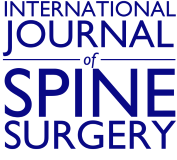ABSTRACT
Lumbar disc herniation (LDH) is a frequent cause of low back pain and radiculopathy, disability, and diminution in quality of life. While nonsurgical care remains the mainstay of initial treatment, symptoms that persist for prolonged periods of time are well treated with discectomy surgery. A large body of evidence shows that, in patients with unremitting symptoms despite a reasonable period of nonsurgical treatment, discectomy surgery is safe and efficacious. In patients with symptoms lasting greater than 6 weeks, various forms of discectomy (open, microtubular, and endoscopic) are superior to continued nonsurgical treatment. The small but significant proportion of patients with recurrent disc herniation experience less improvement overall than patients who do not experience reherniation after primary discectomy. Lumbar discectomy patients with large annular defects (≥6 mm wide) are at a higher risk for recurrent herniation and revision surgery. Annular closure via a bone-anchored device has been shown to decrease the rate of recurrent disc herniation and associated reoperation in these high-risk patients. After a detailed review of the literature, current clinical evidence supports discectomy (open, microtubular, or endoscopic discectomy) as a medically necessary procedure for the treatment of LDH with radiculopathy in indicated patients. Furthermore, there is new scientific evidence that supports the use of bone-anchored annular closure in patients with large annular defects, who are at greater risk for recurrent disc herniation.
Footnotes
Disclosures and COI: JI: salaried employee of Telos Partners, LLC, which received payments from ISASS to support literature review and manuscript development. Telos Partners, LLC, has received fees unrelated to this manuscript from entities in the spine space, including Zimmer Biomet, Orthopediatrics, Intrinsic Therapeutics, K2M, Medacta International, Merit Medical, Wenzel Spine, and SiNtx Technologies. CWK: Consultant for Elliquence, paid member of Mock FDA Advisory Panel for Intrinsic Therapeutics. AA: Consulting fees from Intrinsic Therapeutics. JY: Consultant for Elliquence Spine, Vertical Spine, Aesculap Spine. ML: None.
- ©International Society for the Advancement of Spine Surgery
- This manuscript is generously published free of charge by ISASS, the International Society for the Advancement of Spine Surgery. Copyright © 2020 ISASS.






